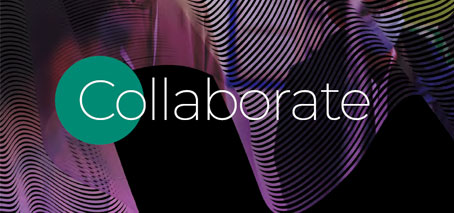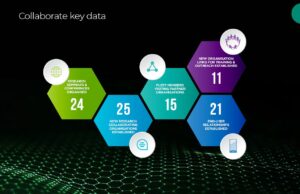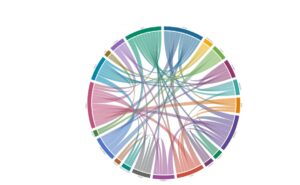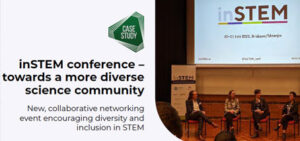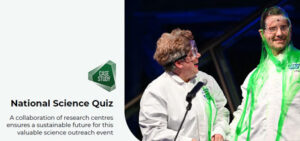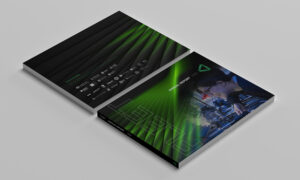
This is an extract from the 2022 FLEET annual report [read the full report online] See previous section (Innovation) / see next (Outreach)
FLEET is building synergies between Australian research communities. The percentage of cross-node publications has grown each year from 3% in the Centre’s first year (2017) to 23% in 2022, reflecting the importance of inter-node research in FLEET.
Publications involving multiple chief investigators, associate investigators, partner investigators and/or nodes make up 69% of all FLEET publications.
Out of 121 publications:
- 28 papers involved multiple FLEET nodes
- 21 have multiple chief investigators
- 13 were co-published with FLEET partner organisations
- 63 were co-published with scientific associate investigators
- 13 were co-published with other Centres of Excellence
- 84 involved multiple chief, associate or partner investigators and/or nodes.
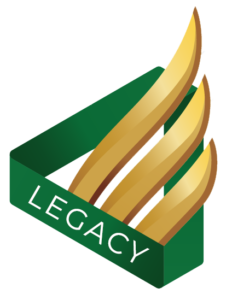
FLEET will:
• Establish strong, lasting links between Australian and international science communities
• Maximise ongoing benefit to Australia from established FLEET networks and linkages.
JUMP-STARTING THE AUSTRALIAN ELECTRONIC MATERIALS COMMUNITY
FLEET’s activity and success over five years has galvanised the Australian electronic materials research community, and added momentum to a rising semiconductor community.
The health of the greater scientific community opens up new opportunities for further scientific advancement of FLEET’s discoveries, commercial development of intellectual property created to date, and new research programs stemming from capacity and relationships built up through FLEET’s funding period.
It also represents lasting value to Australia’s science efforts.
In June 2022, capitalising on the presence in Australia of many leading semiconductor scientists at the International Conference on the Physics of Semiconductors (ICPS) in Sydney, FLEET hosted a one-day ICPS Satellite Symposium. Around 50 members and guests attended the symposium in which Australian and international experts discussed 2D materials, topological materials and spin phenomena, and exciton and exciton-polariton science.
In March 2023, FLEET will host a Future Electronic Materials Research in Australia workshop, looking at pathways for Australia’s research community to build capacity, networks and funding support addressing ‘grand challenges’ in electronics materials.
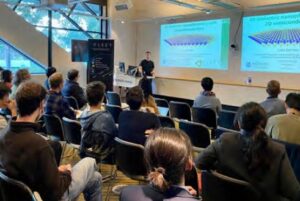 HOSTING RESEARCH SEMINARS
HOSTING RESEARCH SEMINARS
FLEET’s continuing research seminar series focused in 2022 on presentations from PhD students and ECRs, improving members’ public communication skills and exposing their research to a wider audience outside their own research groups.
In 2022, without COVID restrictions, the Centre took advantage of the ability to conduct hybrid workshops (i.e. including both online and in-person audiences) wherever possible.
FLEET ran 14 seminars in 2022: 10 presented by FLEET early-career researchers (ECRs) and four joint seminars introducing Centre members to relevant research from the ARC Centre of Excellence for Transformative Meta-Optical Systems (TMOS), Monash School of Physics and Astronomy, Monash Materials Science and Engineering, and UNSW.
The seminars cumulatively attracted an audience of almost 400 with around 70 participants from outside the Centre.
In addition, FLEET conducted one seminar on research translation and five intellectual property seminars with FLEET Translation Program Manager Michael Harvey, conducted at different FLEET nodes.
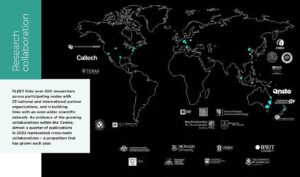 US–Australian transpacific condensed-matter talks
US–Australian transpacific condensed-matter talks
FLEET’s Trans-Pacific Colloquium series continues to maintain links between physics communities in Australia and North America.
Since its initiation, the series has hosted 28 colloquia with speakers alternating between North American researchers and Australian-based universities. Gender mix has been an ongoing focus, and 50% of the speakers in 2022 were women.
In 2023 the series will expand to include European-based speakers.
The series’ organisation committee is led by FLEET Associate Investigators Dr Dmitry Efimkin (Monash) and Prof Susan Coppersmith (UNSW), who direct series strategy, coordinate publicity and manage speaker recruitment, seeking expertise specific to FLEET goals and research interests.
FLEET, with Centre partners Joint Quantum Institute (University of Maryland) and Monash University, inaugurated the transpacific colloquium series in 2020, presenting novel developments in condensed-matter and cold-atom physics.
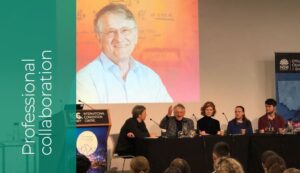 Professional collaboration
Professional collaboration
FLEET continues to proactively seek out opportunities to partner with other science and educational organisations to further the reach of Centre-relevant science, to advance equity issues and to develop future leaders.
For example, in 2022 the Centre:
- Ran a professional development workshop on teaching quantum physics to primary school teachers at STAVCON (Victorian) and CONASTA (Australian) science teachers’ conferences
-
Co-hosted the Gordon Godfrey Workshop, attracting more than 130 delegates with speakers from Belgium, Germany, New Zealand, Singapore, Switzerland and the USA
- Worked with veski to deliver a professional development workshop focusing on personal branding and career planning, engaging 12 STEM professionals from 11 industry organisations
- Co-hosted the inaugural inSTEM conference with nine other research organisations – a networking and career-development conference for under-represented groups in STEM; see case study
- Built and leveraged relationship with CSIRO STEM Professionals in Schools to increase engagement with regional and remote schools
- Worked with Deadly Science to engage and share knowledge with Indigenous students in remote communities
- Continued the transpacific colloquia series with the Joint Quantum Institute (University of Maryland) and Monash School of Physics and Astronomy, with speakers from seven US universities: Universities of Minnesota, Illinois Urbana-Champaign, Michigan, Colorado Boulder, Stony Brook University, University of California (UC) Santa Barbara and UC Berkeley; see above
- Co-hosted research seminars with the TMOS Centre of Excellence, Monash School of Physics and Astronomy, Monash Materials Science and Engineering, and UNSW; see above
- Delivered the fourth year of FLEET’s Future Electronics unit with John Monash Science School (JMSS)
- Worked with JMSS and Monash Faculty of Science to arrange hosting of four work-experience secondary students
- Conducted interactive workshops for three JMSS programs: Immersion Day, Regional Exchange and MySci
-
Chaired the committee for the 2022 National Science Quiz, working with ARC Centres of Excellence for Plant Success in Nature and Agriculture, Engineered Quantum Technology (EQUS), Exciton Science, Gravitational Wave Discovery (OzGrav), and MATRIX Mathematics Research Institute, Monash Engineering, and Defence Science Australia; see case study
- Engaged with Cruxes Innovation to develop ECRs’ transferable skills in industry engagement, continuing the annual Idea Factory collaboration with the ARC Centre for Engineered Quantum Technology (EQUS); see case study.

